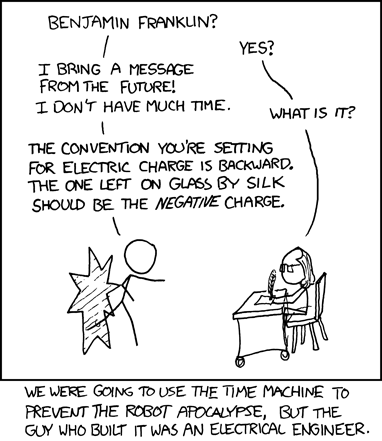Recent searches
Search options
Why do we call electrons 'negative' and protons 'positive'? It's an arbitrary convention but it's annoying: it means that when electrons flow through wires, the current is defined to flow in the OTHER DIRECTION.
If you ask people why electrons got called 'negative', you get a bunch of crap answers:
"Electrons are referred to as negative because of their behavior in an electric field. In an electric field, an electron will move from the negative pole to the positive pole, giving it a negative charge by convention."
Yes, but why THAT convention?
"If we re-designate all positive electric charges as negative and vice versa, while keeping their absolute value, the resulting physics would be the same. So exact choice is merely a matter of convention."
Yeah, it's a convention - but why THAT convention?
"In quantum theory of elementary particles (in a sense of irreducible representation of Poincare group with mass m and spin (helicity) s) if some operator Q of internal symmetry commutes (like electric charge charge) with Hamiltonian H...."
Irrelevant crap which never leads up to an answer.
The answer is that Benjamin Franklin chose this convention and nobody knows why.
In Franklin's day there was a 'two-fluid' theory of electricity saying electricity comes in two kinds. Around 1750 he developed a 'one-fluid' theory after showing that a rubbed glass receives an equal but opposite charge as the cloth used to rub the glass. He decided that electrical fluid was going into the glass. So he said the charge of the glass was 'positive' and the cloth was 'negative'.
Unfortunately it turns out that that electrons are going into the cloth.
The whole history is interesting:
@johncarlosbaez It could have been worse. Imagine if a Frenchman, say, had been working on the same things at the same time, only with the opposite convention, and French physicists then stubbornly stuck with it to this day while everybody else followed Franklin.
@mansr
The ones stubbornly using weird units are the people in the US, not the French
@johncarlosbaez
@j_bertolotti @mansr - actually if the French had chosen the convention that electrons are positive, this better system might have been adopted as part of the metric system, and then scientists would be using it!
It would be much better to have a coulomb defined to be equal to the charge of 6.241509 × 10¹⁸ electrons, rather than 6.241509 × 10¹⁸ positrons as it currently is.
Well, the definition doesn't *say* positrons: it says 6.241509 × 10¹⁸ e, where of course e is *minus* the charge of an electron.
@johncarlosbaez @j_bertolotti @mansr
The obvious solution is to switch from using electronics to positronics.
According to Asimov, it would even lead to improvements in AI!
@TruthSandwich @j_bertolotti @mansr - maybe in Asimov's future they've finally changed the conventions so electrons are positive... but then renamed them 'positrons'.
@johncarlosbaez @j_bertolotti @mansr
That seems less probable than true AI.


